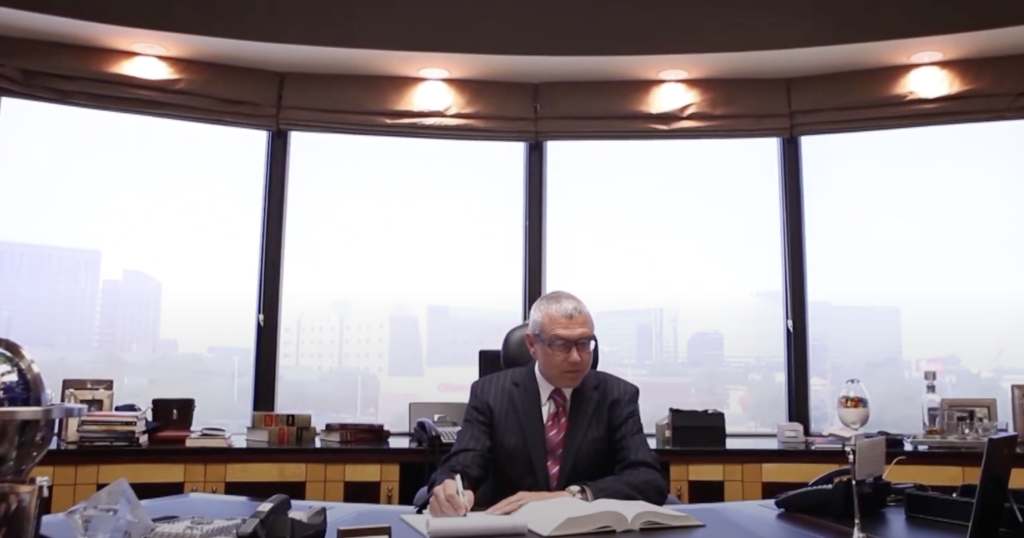
Larry Friedman is in a somewhat unique position when he gets to the office every morning at his Dallas law firm, Friedman & Feiger.
Although he was the first lawyer in his family and the first to go to college, Friedman now goes to work every day with his sons, Jason and Eric Friedman, who also practice law at Friedman & Feiger. Janelle Friedman, Larry Friedman’s wife, serves as the firm’s chief operating officer.
So, it made sense to Larry and Jason Friedman that they should represent a handful of bars challenging the June 26 coronavirus shut-down by Gov. Greg Abbott: many of them were also family businesses — stand-alone bars forced to close their doors on three-hours’ notice.
The Friedmans say their lawsuit on behalf of eight bars represents the Lone Star State’s 50,000 bar and night club employees that allege their constitutional rights were violated by Abbott’s order shutting down establishments that generate at least 51% of their revenues in alcohol.

As a result, the Friedmans say, these workers have been unable to earn a living to support their families while a selected group of “affiliated” peers — bars attached to hotels, restaurants, bowling alleys and other establishments — continue unaffected.
“For my clients it’s not about making new law; it’s not about challenging the governor — it’s just about feeding their families,” Larry Friedman told The Texas Lawbook. “The goal for the clients is to get their establishments open and get their employees back to work.
“You have a lot of people who are out of work, can’t earn a living and these people are going to suffer very shortly,” he said. Their mortgage and landlords are out of patience. We’ll see lots of foreclosures and evictions coming up, so we’re trying to prevent these 50,000 people from being victims of bad law.”
In its month-long lifespan, their case has already seen some peaks and valleys. Two judges have declined requests for a temporary restraining order banning enforcement of Abbott’s order. However, Dallas state judge Martin Hoffman also declined the government’s request to dismiss the suit and ordered the testimony of Tilman Fertitta and Robert Rowling, two service industry billionaires serving on Abbott’s COVID-19 task force who are considered key witnesses for the plaintiffs’ case.
But recent actions by the Texas Attorney General’s office and Abbott himself suggest that the governor will fight the litigation tooth and nail, creating a longer, more obstacle-riddled road ahead than the bar owners had hoped for.
Throughout last week as Abbott toured the state to give briefings and answer questions on coronavirus updates, he said that the positivity rate of the virus needs to fall below 10% for a sustained period of time before he would allow bars to re-open. Currently, positive COVID-19 tests are more than double that.
Scant minutes after Judge Hoffman had denied the governor’s request to dismiss the litigation on a jurisdictional basis during a July 21 virtual hearing, Assistant Attorney General Benjamin Dower said his office had already filed a notice of accelerated appeal. The notice, stamped at 2:15 p.m., entered the record before the hearing had officially adjourned and before Judge Hoffman had even signed an order, which did not come until three days later.
Beyond re-opening the door for the plaintiffs’ suit to be dismissed, the interlocutory appeal is delaying the testimony of Fertitta and Rowling, whose depositions are designed to supplement the evidence Judge Hoffman will eventually consider at a temporary injunction hearing. Before the governor’s appeal, one was scheduled for July 27.
But as the AG’s office prepares to file its appellate brief due in next week, Friedman still feels his clients have a strong case.
“The court’s job … is to give these orders strict scrutiny or some rigorous form of review to ensure constitutional validity of the governor’s actions,” Friedman said.
“The Texas Supreme Court laid out in Salon a la Mode that the government must use the least restrictive measure,” Friedman added, referring to high-profile Dallas hairdresser Shelley Luther’s recent Supreme Court case, which is cited prominently in Friedman’s July 8 lawsuit. “Those are the same least restrictive measures that the governor has applied to every other business in the state except standalone bars.”
Friedman said his approach to the case is “everybody knows from right and wrong.
“If this was a good executive order and there was no rational basis for claims, then I’d tell that to the client,” he said.
Dower and the Office of the Attorney General declined to comment for this story.
Asked what he perceives as the biggest obstacles of the case so far, Friedman said “it’s the politics of it” and “the perception that people are more likely to contract the COVID virus in the bar than they are somewhere else.
“But it’s the same as everything else,” he said. “In any conversation, people will generally breathe on you unless you wear a mask and unless you observe social distancing. Just like grocery stores, bar owners are capable of following the restrictions that every other business has been allowed to put in place.”
Some standalone bars around the state have been reinventing themselves so that they can re-open immediately in compliance with Abbott’s executive order or find other ways to financially weather through it.
Acclaimed Houston cocktail bar Julep, for example, added a cocktail delivery truck service to its business model. Dallas favorite Katy Trail Icehouse reopened its doors to patrons Aug. 7 after working with the TABC to sell more food than alcohol. Before the pandemic, the popular outdoor bar sold the most alcohol of any other standalone bar in the city, averaging $530,000 per month in alcohol sales.
Friedman says these recent adaptations by industry peers don’t affect his clients’ approach to their case because not all of them sell food or a significant enough amount of food to simply adjust their sales percentage to outweigh the amount of revenue they collect from alcohol sales.
While he congratulated Katy Trail Icehouse on opening, “it goes to show you how random the governor’s order is and the blatant violation of the constitutional equal protection clause if the same establishment can sell one more salad and one less beer and be permitted to open one day later,” he said.
‘We Always Get the Tough Cases’
Despite the obstacles, the bar owner litigation appears to fit the mold perfectly for the kinds of cases Friedman’s firm takes on.
“We always get the tough cases,” he said. “When people have an insurmountable problem and all else fails, they come to us. But we usually find a way to help them because we look for efficient, practical business solutions. It’s not to make any academic or esoteric point. We ask clients to tell us what the goals are right up front. It’s not to go to trial to win a case every time.”

The lawyers at Friedman & Feiger — particularly Jason Friedman — have handled numerous matters for clients in the service industry.
One of those clients is Dallas service industry entrepreneur Brandon Hays, who is spearheading the plaintiffs’ group in the current lawsuit. Three of Hays’ bars — Tiny Victories, High Fives and The Whippersnapper — are part of the plaintiff group.
In addition to Hays, Jason Friedman said he has previously advised the owners of one of the other bar plaintiffs, Stirr Restaurant, on legal matters.
“They have five or six restaurant concepts and are not big enough to have a general counsel … but they need somebody to help with employment agreements or the occasional lawsuit or legal contract,” Friedman said.
Friedman said he agreed to take the case after Hays called him about Abbott’s order.
“Part of our responsibility is to fight for people,” the younger Friedman said. “He (Hays) said, ‘I don’t think it’s fair.’ I said, ‘I don’t either. I think it’s unconstitutional but I need a client to sue the governor.’ Brandon wanted to stick up for everybody and lead the pack.
“When someone hires you, it’s an honor,” Friedman said. “You should be honored that [clients] trusted their important matters to you. To him (Hays), with the whole shutdown, this is important to him.
“He said, ‘I’ve got families to feed, a 94-year-old grandmother at home and my wife is expecting a baby. Why am I being treated differently than a restaurant or a bar?’” Friedman said.
Other firm clients in the service industry include Clutch Group — a restaurant, bar and nightclub group that owns Concrete Cowboy, Clutch Bar, The Sporting Club and Sugar Room — and Vandelay Hospitality Group — a restaurant group including East Hampton Sandwich Co., Hudson House and Drake’s Hollywood. In April, Vandelay was among an early wave of restaurants who began suing their insurers for business interruption losses from the pandemic.
From Queens to Dallas
Beyond advocating for the service industry in business disputes, Larry Friedman said Friedman & Feiger has represented “probably a thousand different businesses across the board”— real estate, banking, energy, cyber, healthcare and others — on any dispute ranging from torts to partnership breakups to securities litigation.
The variety of matters that the firm handles is reflective of Friedman’s own versatility. Throughout the years of Friedman’s four-decade legal career, his practice has pivoted from litigation to corporate transactions (particularly real estate deals and tax issues) to litigation again.
A native of Queens, New York, Friedman graduated from Queens College in 1973, “in between Paul Simon and Jerry Seinfeld but before Ray Romano.” He was the first in his family to go to college.
While there, Friedman served as student body president, which led him to spend time in Washington as part of the national student body organization, the National Student Association. While there, Friedman said he met “everybody on Capitol Hill except Nixon.” This included former vice president Hubert Humphrey, whose funeral Friedman attended. Humphrey’s roots in Minnesota helped influence Friedman to attend law school at Humphrey’s alma mater, the University of Minnesota.
“I was very politically active in the Vietnam War days, and my interests always geared toward the law,” Friedman said. “I was always a good public speaker and interested in people. Helping people has always been what I do. I do it because I love it.”
After law school Friedman moved to Dallas, where he started a few different firms with different law partners throughout the eighties and nineties before eventually starting Friedman & Feiger with Robert Feiger. His first law partner was Ira Tobolowsky, the high-profile Dallas lawyer who was found dead inside his burning garage four years ago. His murder remains unsolved.
“I think about him every day. He was my best friend,” Friedman said. “Ira was a good lawyer, and he wasn’t a mean lawyer — I can be mean. I’m versatile, but I can be mean.”
Friedman has made a name for himself over the years advocating for clients in a manner some may call aggressive. But he’s represented some of the biggest names.
Over recent years, Friedman has made headlines for representing American Sniper Chris Kyle’s widow in a dispute with her slain husband’s business partners, Pilar Sanders in her divorce from former NFL player Deion Sanders and “Frack Master” Chris Faulkner when the U.S. Securities and Exchange Commission prosecuted him for spending tens-of-millions in investor money on booze, strippers and expensive cars. He’s represented Troy Aikman’s ex-wife, Rhonda Aikman, billionaire Andy Beal’s ex, Simona Beal, as well as former Dallas County District Attorney Craig Watkins and his wife, Tanya.
Currently, Friedman is representing a longtime distributor of Red Bull in a $31.5 million fraud and breach of contract suit. Dallas hedge fund manager Kyle Bass also recently hired Friedman to represent him and his firm, Hayman Capital, in their ongoing defamation dispute with residential lender United Development Funding.
Has he mellowed in recent years?
“The real response is I’ve really become more focused on meeting my clients’ goals and being more efficient at the work that I do,” Friedman said. “Here’s the thing: I like lawyers and I like judges, and I love practicing law. But I don’t like incompetence. I don’t like lawyers who don’t put their clients’ interests first and I don’t like dishonest lawyers.
“So yes, lawyers get frustrated dealing with me because I don’t stand for incompetence, dishonesty and I don’t stand for lawyers who don’t put their clients’ interests first. And I’m fearless.”
A Family-Run Firm
“It doesn’t work for everybody, but it works for us,” Friedman says of having a family-owned law firm. “It’s really exciting to have a family-run firm. The communication is very efficient and there’s a lot of pride and pleasure in seeing your own children develop. I’m very proud of my children.”

Five of Friedman’s six children became lawyers, Friedman said — three boys, two girls. While Jason and Eric Friedman work with their father, his daughters work out of state. “The girls don’t want to work with the brothers, they’ve had enough,” Larry says.
Jason Friedman, the oldest lawyer out of the Friedman kids, said he grew up going to the courthouse and to mediations with his dad, and that he’s known some of the lawyers at Friedman & Feiger since he was a kid.
He describes his father’s style in the courtroom as having a “command of his case” once he speaks.
“He has a command of the courtroom … he connects with the jurors,” he said. “He does a very good job at examining the witnesses and leaving no stone unturned. He’s always taught me to be a good advocate … [and to] understand what the client’s goals are.”
While some people Friedman talks to say they could never work for their dad, he says it’s probably because they confuse the work and family roles.
“People look at them as their dad as opposed to their boss. My view always at this office is that he’s the senior lawyer, so I take his advice and learn from [him],” Friedman said. “He is probably harder on me than everybody else because obviously as his son I’m not going anywhere … but I’m OK with the pressure.”
It’s also a bonus that Larry Friedman’s wife, Janelle, runs the law firm.
“I’m one of the few lawyers who practices law 100% of the time,” Larry Friedman said.
As chief operating officer of Friedman & Feiger, Janelle Friedman makes all the decisions: administrative, financial, and the hiring and firing of staff. And that’s in addition to her many other business endeavors.
“I call her the Amazing Janelle,” Friedman said of his wife. “My wife is big time. She runs the firm, runs the family, wins every argument and is very active in charity in Dallas. She owns a cosmetic line called GoodJanes, and she wrote a book on entertaining.
“And she’s trying to kill me,” Friedman added. “She’s made me gluten-free, fat-free … I hate it. I was fat and happy before she got her hands on me. Now I’m skinny and miserable. And she makes me exercise every day.”
Part of Friedman’s exercise regimen is running three to four miles a day, which, besides being a good husband following his wife’s wishes, Friedman says he does so he can practice law as long as possible.
“As long as the phone keeps ringing,” he says. “I like what I do.”
